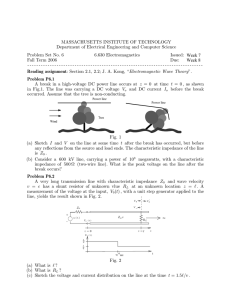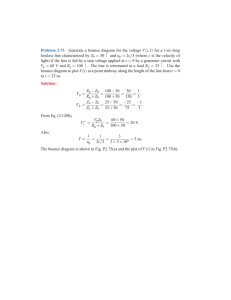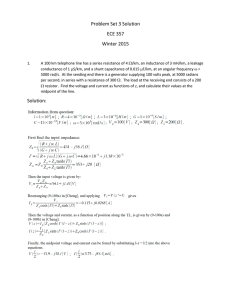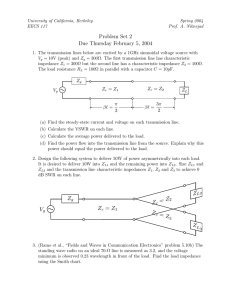problem set 5 - University of Toronto
advertisement
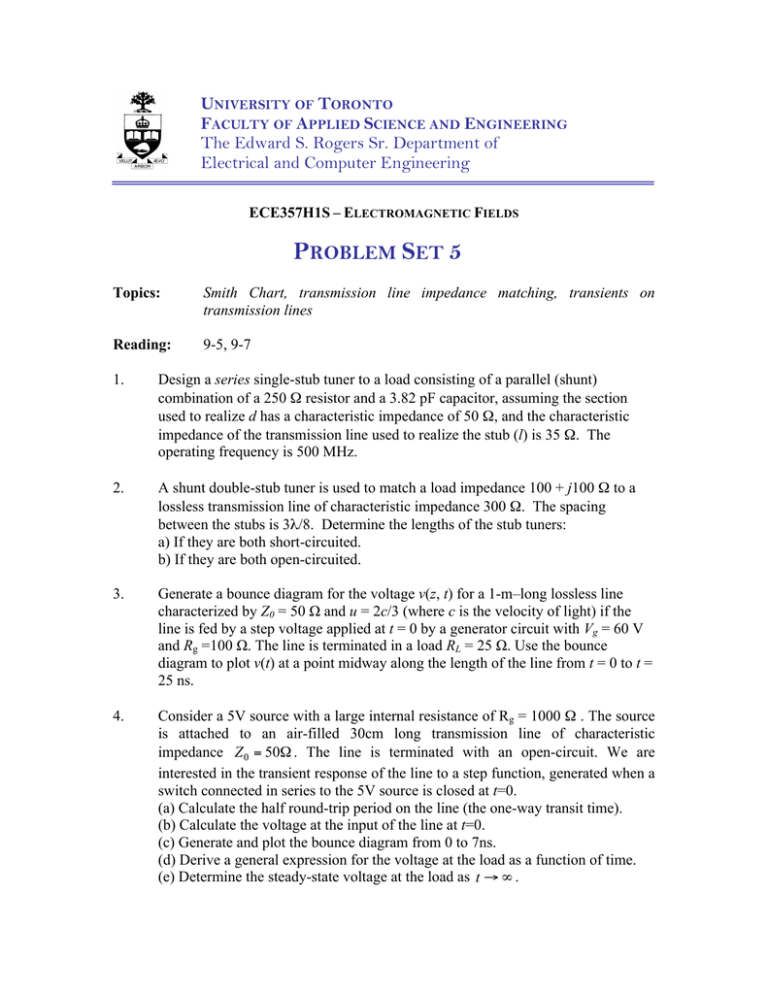
UNIVERSITY OF TORONTO FACULTY OF APPLIED SCIENCE AND ENGINEERING The Edward S. Rogers Sr. Department of Electrical and Computer Engineering ECE357H1S – ELECTROMAGNETIC FIELDS PROBLEM SET 5 Topics: Smith Chart, transmission line impedance matching, transients on transmission lines Reading: 9-5, 9-7 1. Design a series single-stub tuner to a load consisting of a parallel (shunt) combination of a 250 Ω resistor and a 3.82 pF capacitor, assuming the section used to realize d has a characteristic impedance of 50 Ω, and the characteristic impedance of the transmission line used to realize the stub (l) is 35 Ω. The operating frequency is 500 MHz. 2. A shunt double-stub tuner is used to match a load impedance 100 + j100 Ω to a lossless transmission line of characteristic impedance 300 Ω. The spacing between the stubs is 3λ/8. Determine the lengths of the stub tuners: a) If they are both short-circuited. b) If they are both open-circuited. 3. Generate a bounce diagram for the voltage v(z, t) for a 1-m–long lossless line characterized by Z0 = 50 Ω and u = 2c/3 (where c is the velocity of light) if the line is fed by a step voltage applied at t = 0 by a generator circuit with Vg = 60 V and Rg =100 Ω. The line is terminated in a load RL = 25 Ω. Use the bounce diagram to plot v(t) at a point midway along the length of the line from t = 0 to t = 25 ns. 4. Consider a 5V source with a large internal resistance of Rg = 1000 Ω . The source is attached to an air-filled 30cm long transmission line of characteristic impedance Z 0 = 50Ω . The line is terminated with an open-circuit. We are interested in the transient response of the line to a step function, generated when a switch connected in series to the 5V source is closed at t=0. (a) Calculate the half round-trip period on the line (the one-way transit time). (b) Calculate the voltage at the input of the line at t=0. (c) Generate and plot the bounce diagram from 0 to 7ns. (d) Derive a general expression for the voltage at the load as a function of time. (e) Determine the steady-state voltage at the load as t → ∞ . (f) Sketch the voltage waveform at the load as a function of time. (g) Calculate the time required so that the voltage at the load reaches 90% of its steady-state value found in part (f). 7. A lossless coaxial cable with Z0 = 100 Ω and of length L =3 m is terminated in a resistive load RL = 40 Ω as shown in Figure 1. The dielectric between the two conductors of the cable has a relative dielectric constant of εr =4. At time t=0, a switch connected to a 15 V battery is closed as shown. The resistor Rg = 50 Ω. a) Determine the amplitude of the step function initially launched onto the line, and the one-way transit time of the line. b) Plot the voltage as a function of time at position z=1 m for 0 ≤ t ≤ 120 ns. Label your graph clearly and show all relevant voltages and times of discontinuities. c) Plot the voltage as a function of time at the load for 0 ≤ t ≤ 120 ns. Label your graph clearly and show all relevant voltages and times of discontinuities d) Determine the steady-state value of the voltage observed at i) z=0; and ii) z=L as t →∞. e) If a 15V pulse generator was used in place of the battery and switch, and the pulse width is 2 ns, determine the voltage as a function of time at z = 2 m for 0 ≤ t ≤ 120 ns. f) Repeat part e if the pulse width is 30 ns. 8. A lossless transmission line of length l = 2 m is connected to a 15 V battery via a 75 Ω source resistance when the switch is closed at t = 0, as shown below. Ignore the resistor shown in the dashed lines for now. The characteristic impedance of the line is 50 Ω and the one-way transit time of the line is 10 ns. The load resistance is RL = 150 Ω. a) Plot v(z = 0.5 m, t) for 0 ≤ t ≤ 50 ns. b) Plot v(z, t = 32.5 ns) for 0 ≤ z ≤ 2 m. c) A shunt resistor shown in the dashed line in Figure 1 is introduced and has a value of RP =37.5 Ω. Determine the amplitude of the incident step function launched onto the line at t = 0. d) Repeat part (b) with the resistor RP in place.
